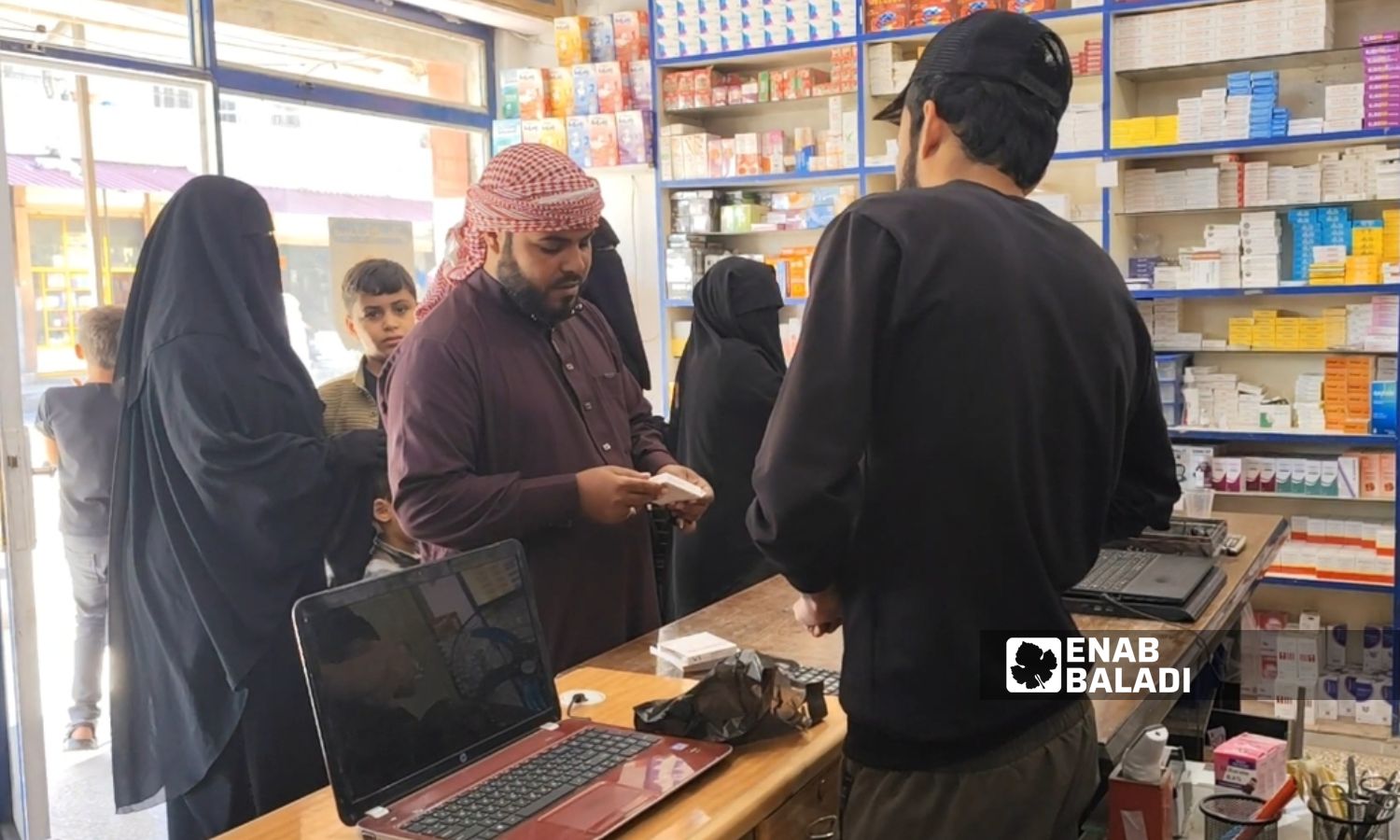



Enab Baladi – Ras al-Ain
Most residents in the city of Ras al-Ain, northwest of al-Hasakah, directly go to the pharmacy to diagnose some diseases and get medications to alleviate pain and aid in treatment.
This situation is widespread throughout most of Syria, primarily driven by the high consultation fees of doctors. However, what sets Ras al-Ain apart is the scarcity of medical staff, the absence of many specialties, and the small geographical area. The region is confined between the Turkish border and the Syrian Democratic Forces (SDF).
Ms. Majda (30 years old) has been suffering from migraines for seven years, causing recurrent and severe headaches. She told Enab Baladi that she could not find a doctor to help assess her condition, exacerbating her pain.
She added that one day, her sister advised her to go to a well-known pharmacy in Ras al-Ain to describe her condition and get suitable medication to ease her continuous pain. She went and received medicine from the pharmacy that alleviated her pain, and she has been using it for years.
Meanwhile, Firas al-Hassan told Enab Baladi that he had stomach pains and went several times to the National Hospital in Ras al-Ain, but the crowding in the hospital prevented him from getting an appointment with the doctor.
He explained that his stomach pain intensified, forcing him to visit the pharmacist, who prescribed him some medications and administered an intravenous drip. He added that he felt better after taking the medications, although the pain did not completely disappear.
A pharmacist in Ras al-Ain, who requested anonymity, told Enab Baladi that pharmacists are aware that their services are limited and do not replace the need to see a doctor in complex or severe cases. However, they try as much as possible to help patients and provide medical advice.
He explained that the shortage of medical staff and specialists left residents with no option but to resort to pharmacies for treatment.
He added that pharmacies in Ras al-Ain currently serve as health centers that treat patients due to the weakness of medical services in the area. They provide intravenous medications, among other things.
He mentioned that he knows this is against the law and that pharmacies are supposed to provide medications only through a prescription from a doctor. However, when a patient comes in without prior treatment, the pharmacist is compelled to intervene to improve their condition.
The pharmacist emphasized the need to support the public health sector and provide doctors in Ras al-Ain, especially specialists for chronic diseases.
Resorting to pharmacies for treatment carries multiple risks, including incorrect diagnosis and inappropriate medication, which could delay treatment and worsen the health issue. The pharmacist might also give an incorrect or inappropriate dosage for the patient’s condition.
Dr. Mohammad al-Fadh from Ras al-Ain told Enab Baladi that a considerable number of patients go to pharmacies before visiting a doctor.
He explained that the pharmacist currently takes on the role of a doctor in diagnosing cases without having the clinical diagnostic expertise of a doctor or knowing the patient’s illnesses.
He added that he has seen poisoning cases resulting from drug interactions caused by the pharmacist’s prescription, stressing the importance of medical oversight and societal awareness to avoid health risks stemming from random treatment practices that could impact patients’ lives.
The doctor mentioned that the pharmacist tries to provide more than one prescription to the patient, and when unable to treat them, the pharmacist refers them to a doctor, leading to a deterioration in the patient’s condition and causing drug interactions. Additionally, it results in higher costs for unnecessary medications.
He pointed out that the biggest risk lies in the absence of specialized certificate holders in the pharmacy. Most of those present in pharmacies are nurses, which could endanger patients’ lives if the pharmacist is unaware of the chemical composition.
In a previous statement to Enab Baladi, the Director of Health in Ras al-Ain, Rakan al-Joulood, said that the main reason for the deterioration of health services in the area is the lack of medical staff and doctors, along with the weak financial support provided to them.
He added that the National Hospital in Ras al-Ain suffers from a severe shortage of medical staff, negatively affecting the quality of healthcare provided to patients.
Al-Joulood noted that the city of Ras al-Ain also suffers from a shortage of staff, nurses, and technicians. Most previous doctors were from outside Ras al-Ain, as many doctors from the city have emigrated abroad seeking a better life.
Compared to areas in northern Aleppo, the city of Ras al-Ain faces a “severe” shortage in support, according to al-Joulood. The city lives in a state similar to “siege and isolation,” hindering efforts to provide necessary support to the medical sector.
Ras al-Ain is home to about 115,000 people, with most residents relying on agriculture as their primary source of income, followed by livestock breeding.
if you think the article contain wrong information or you have additional details Send Correction